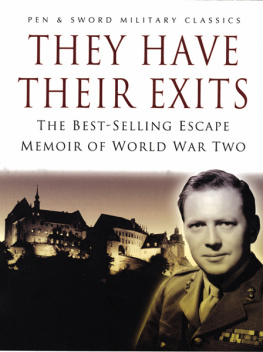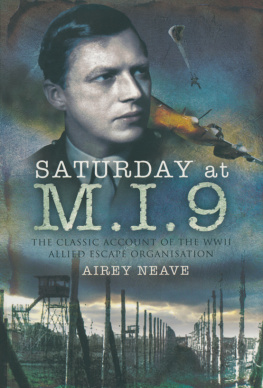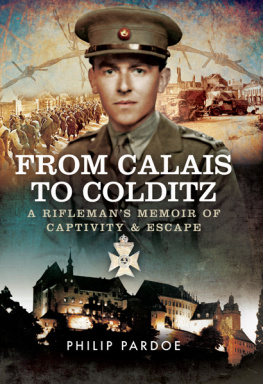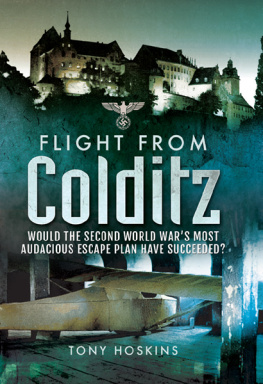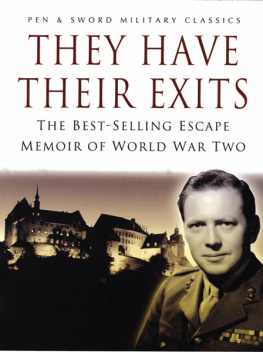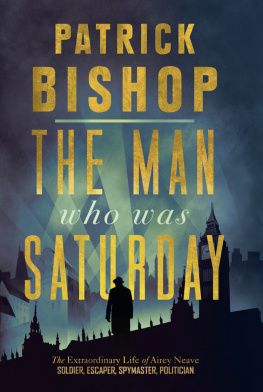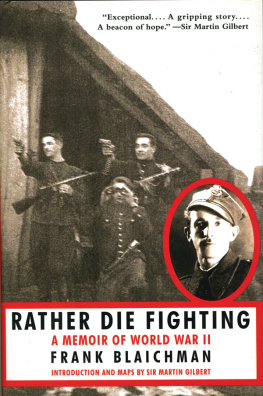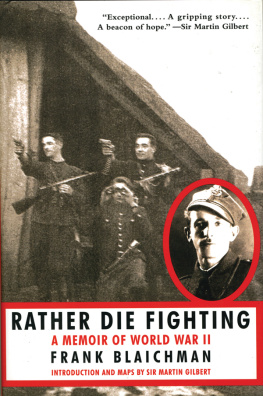First published in Great Britain in 1953
Reprinted in this format 2002 by
LEO COOPER
an imprint of
Pen & Sword Books Ltd
47 Church Street
Barnsley
South Yorkshire
S70 2AS
Copyright The Executors of Airey Neave, 2002
ISBN 0 85052 865 8
PRINT ISBN: 9781844154630
PDF ISBN: 9781783377435
EPUB ISBN: 9781783379439
PRC ISBN: 9781783379231
A catalogue record for this book
is available from the British Library
Typeset in 11/13 Sabon by
Phoenix Typesetting, Ilkley, West Yorkshire
Printed in the United Kingdom by
CPI UK
TO
DIANA, MARIGOLD
AND PATRICK NEAVE
Maps and Diagrams
Foreword
Mr. Airey Neave, the author of this book, is known to a considerable number of people as a rising young barrister and politician. In these two honourable but hazardous professions, the eager aspirant for distinction must be content for a time to be known by the few rather than the many. But Mr. Neave, having a great story to tell, has now written a most moving and fascinating account of a memorable chapter in his life under the title of They Have Their Exits; and it is to me a particular pleasure to commend the author and his work to the attention of the wider reading public. The title was no doubt difficult to resist. It has a singular aptness about it, with an underlying touch of humour that is most fully appreciated when the book has been read. But this tense and exciting narrative is not concerned with the entrances and exits of men and women on to the worlds stage to play their familiar parts. The only exits here described are those that lead the brave and high-spirited prisoner of war from the shackles of captivity to his former world of action and opportunity. Many others have already written on the same theme, and at this distance of time from the great events, the world has been made well aware of the daring and resource of men and women in the bright face of danger. But none of those who have written of what befell them have had the unique experience that the whirligig of time brought to Mr. Neave, and which he has used in this book with such dramatic effect. The young lieutenant of 1940, wounded, captured, imprisoned, suffering intense humiliation, yet lived to be the Major of 1945, who was appointed by the judges at the International Military Tribunal at Nuremberg to a position that brought him into the closest touch with the Nazi leaders when they were, in turn, captured and imprisoned on the collapse of the German Reich. It is this vivid contrast of the escaped prisoner of war set in authority over KEITEL, GOERING, HESS, RIBBENTROP, FRANK and the rest, that gives to this book a quality that no other book of the like kind possesses.
Mr. Neave was taken prisoner by the Germans at Calais in 1940. He made two unsuccessful attempts to escape, but from the supposedly impregnable fortress of COLDITZ, to which he had been moved to discourage all further attempts, he made his successful exit with another brave companion; and together they made their perilous way through Switzerland, France and Spain to England. These prosaic sentences convey little in themselves, but to those with eyes to see and ears to hear, they speak of all that this book contains: the high resolve of courageous men to break their bonds; the moments of weariness and loneliness; the suspense and danger and sickening fear; the cold and hunger and thirst and utter wretchedness; and the hope that never died, because it was sustained and nourished by a candle that could never be put out.
When I first met Mr. Neave I was one of the British judges at Nuremberg in 1945. I knew nothing then of his background of Eton, Oxford and the Temple, or of the tremendous experiences of this book. I knew him as a soldier to whom the judges confided the supremely important work of which he speaks in these pages. He discharged that task with ability, tact and unwearied patience, and I welcome the opportunity of paying my tribute to him. His work was the more commendable when it is remembered that he took into the cells at Nuremberg the recollection of all that he had himself endured at the hands of those to whom he now ministered.
As I looked at Keitel, this strange reversal of fortune brought other memories. I had heard of Mike Sinclair shot down as he tried to escape from the castle at Colditz, of the murders at Stalag Luft III, and the gallant gentlemen in green berets shot without trial. It was this man sitting before me who had carried out these brutal orders no crocodile tears for Keitel.
Naturally, there is a note of exultation that the mighty have been put down from their seats, but there is also the note of satisfaction that justice has overtaken evil men, and the grim reflection that though the mills of God may grind slowly, they nevertheless grind exceeding small.
This book then is a story of the most enthralling kind, with here and there touches of humour and even gaiety, here and there the deeper tones of tragedy and loss, and throughout a revelation of the essential nobility of men and women, when faced with the most desperate and dreadful circumstances. For Mr. Neave has written more than his own story. No man escapes without helpers. No man, having escaped, reaches safety without the loyalty and devotion of obscure men and women, who take their lives in their hands when they aid him. And the final impression of the book, therefore, is of the unconquerable spirit of man displayed in many countries and by many people, of the deathless loyalty of men and women to each other in the extremes of peril and adversity, and of the true valour that in some measure redeems the waste, the tragedy and the irreparable loss.
I certainly hope that this book will be widely read.
NORMAN BIRKETT
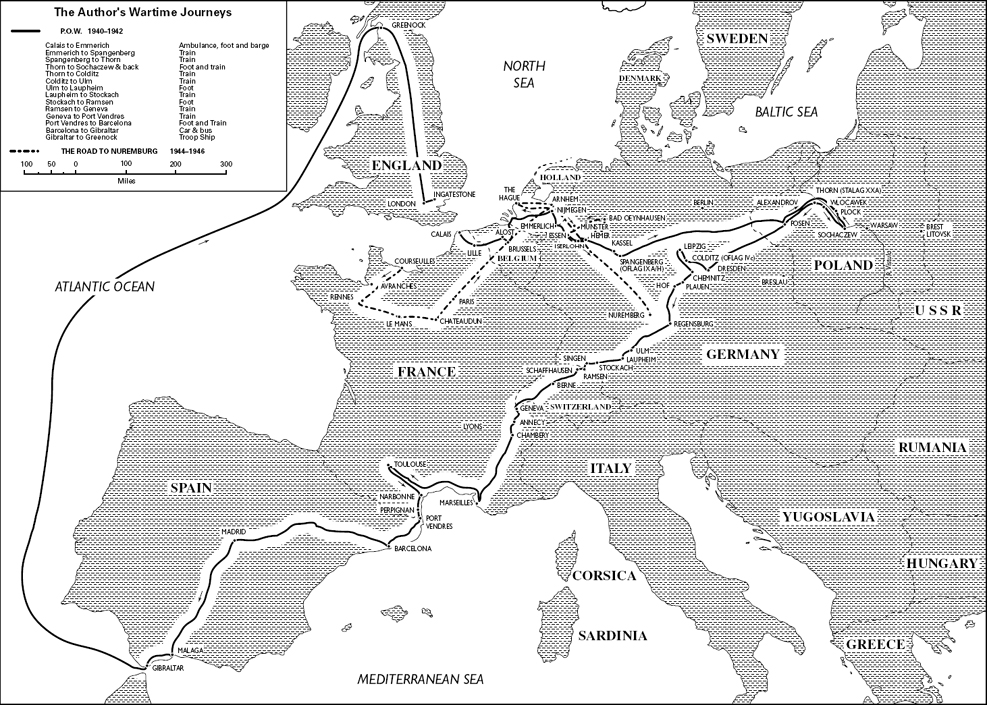
Authors Note
My thanks are due to Miss Dormer Creston, Mr. Charles Sutton and Major P. R. Reid, M.B.E., M.C. for their help in reading the proofs and making many admirable suggestions.
For reasons of security I have altered the pseudonyms of my French Rsistance helpers in .
Chapter I
The man I had come so far to meet was waiting for me. He stood with his back to the window of his cell in the autumn sunlight. He was tall and grey and with tired eyes he watched our little group as it entered the cell. It seemed that his mouth quivered as he waited at attention until Colonel Andrus, the Governor of the Nuremberg Prison, had taken his place beside the bed.
Wilhelm Keitel? I said.
Yes.
I am Major Neave, the officer appointed by the International Military Tribunal to serve upon you a copy of the Indictment in which you are named as Defendant. From somewhere in the prison came the clink of keys. A door was slammed with sudden fierceness. The General Secretary of the Tribunal, the American Prison Chaplain, the Psychiatrist and a group of white-helmeted military policemen crowded the entrance to the cell. They waited eagerly to play their part in the making of History.
I watched the man gather his courage. His square head was held high and he stood there immovable and military, yet utterly woebegone. It was the hour of retribution for General-Fieldmarshal Keitel, Chief of the High Command of the German Armed Forces, member of the Secret Cabinet Council, member of the Council of Ministers for the Defence of the Reich.
Standing before him I was reminded of the words of his countryman, von Logau, describing the slow grinding of the mills of God. It was my duty to set in motion the great proceedings which were to end in his execution as a common murderer.
His field-grey tunic was shorn of decorations and badges of rank and he wore a General Officers grey breeches with a red stripe. Then suddenly I saw his feet. They were swathed in felt slippers many sizes too large. I wanted to laugh my head off. But at least he was not forced, as I had been, to wear clogs or stand with his feet bare on the stone floor of a Gestapo prison. In spite of his ridiculous appearance, he wore a better uniform than the one in which I tried to escape from a German prisoner of war camp. I could not suppose that Keitel would remember the incident. I was only a Lieutenant in the Royal Artillery aged 24, one of the thousands who lingered in the prisoner of war camps under his command. He had never heard of me or known that I was hungry, cold and friendless and of no account. Yet I had often seen his hard features in German newspapers and wondered about the all-powerful Keitel in those hopeless days. He was a man I had long wanted to meet. I had never thought that I should see him as
Next page
